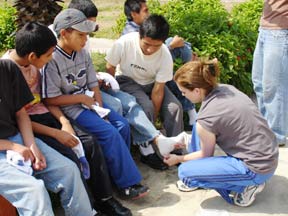Book Reviews
Posted: 7/07/06
Book Reviews
Hell’s Broke Loose in Georgia. Survival in a Civil War Regiment by Scott Walker (University of Georgia Press)
This new book by Scott Walker, pastor of First Baptist Church in Waco, tells the story of the 57th Regiment of Georgia. Walker follows the regiment through the Civil War, beginning with its organization in Savannah in 1862, with more than a passing interest. He is the great-great grandson of one of the regiment’s few members who survived the war.
 |
| What are you reading that other Texas Baptists would find helpful? Send suggestions and reviews to books@baptiststandard.com. |
The book does not offer mere military history. Rather, it presents “family history” of the men who served in the 57th. Through personal letters and journal entries, it vividly describes the human tragedy and personal devastation of war. This may be its chief value.
The book was carefully researched and documented. It is a concentrated read; a good balance be-tween academic material and poolside reading. As one might expect from a pastor, it ends with an “application” section containing the author’s insights gained from writing the book. I found these quite meaningful.
Ron Lyles, pastor
South Main Baptist Church
Pasadena
102 Fascinating Bible Topics for Group Discussion by Preston Taylor (Xulon Press)
 |
Whether we are pastors, teachers or discussion leaders, all of us have been at that place of pondering, “Where do I start?” and “What do I do next?” Author and pastor Preston Taylor has developed an exciting new teaching resource that he calls 102 Fascinating Bible Topics for Group Discussion. The book is easy to use and helps church discussion leaders figure out both where to start and what to do next.
Taylor’s topics—such as angels, faith, health and worship—start with a short illustration that sets up the discussion to follow. Taylor then lists 10 biblical references on each topic and asks thoughtful questions on each Scripture to “start the ball rolling.” An added benefit is this book requires each group member to use his or her Bible.
This book is a gem, and my copy will be well-worn in short order. Both novice and scholar will find this book to be indispensable. Congregations that use the small-group model or the traditional Sunday school structure can benefit from placing this book in every leader’s hands.
Jerry Barker, pastor
First Baptist Church
Falfurrias
Leaves of Hope by Catherine Palmer (Steeple Hill)
 |
In the Christian romance Leaves of Hope, Baylor University graduate Catherine Palmer skillfully weaves a plot of intrigue with threads of faith, hope and love.
Raised in Africa as the daughter of Baptist missionaries, Palmer uses her global knowledge to move Beth Lowell from her hometown of Tyler to New York and a job that requires traveling the world.
While visiting her recently widowed mother, Jan, in Texas, Beth discovers a hidden box clearly meant for her to open after her mother’s funeral. But the impetuous, adventurous Beth can’t wait. She unwraps an antique, hand-painted tea set that reveals her mother’s scandalous secret.
Accompanied by the handsome British owner of Wilson Teas, Beth flies to Darjeeling, India, and a tea plantation in search of a birth father who knows nothing about her. Ultimately, faith enables Beth to face the present with grace and helps Jan face the past with courage.
In Palmer’s award-winning style, the author allows her readers to travel along with the daughter and mother as they run the race God set before them.
Kathy Robinson Hillman, former president
Woman’s Missionary Union of Texas
Waco
News of religion, faith, missions, Bible study and Christian ministry among Texas Baptist churches, in the BGCT, the Southern Baptist Convention ( SBC ) and around the world.


